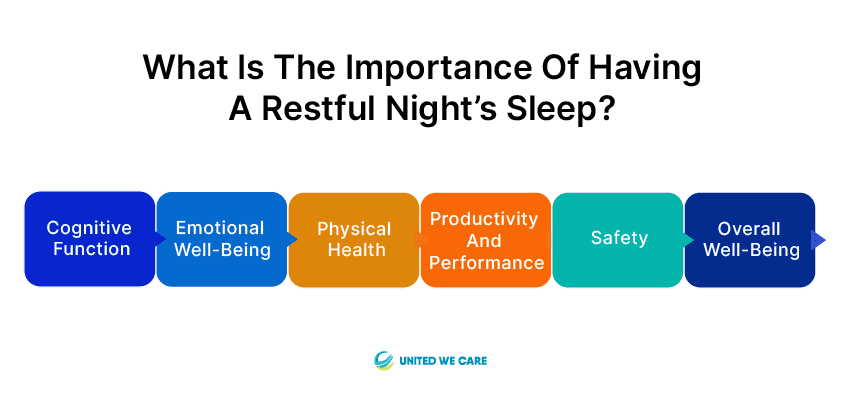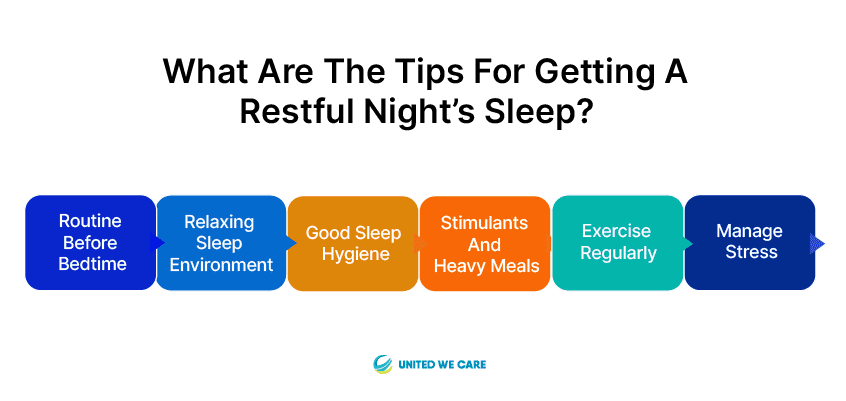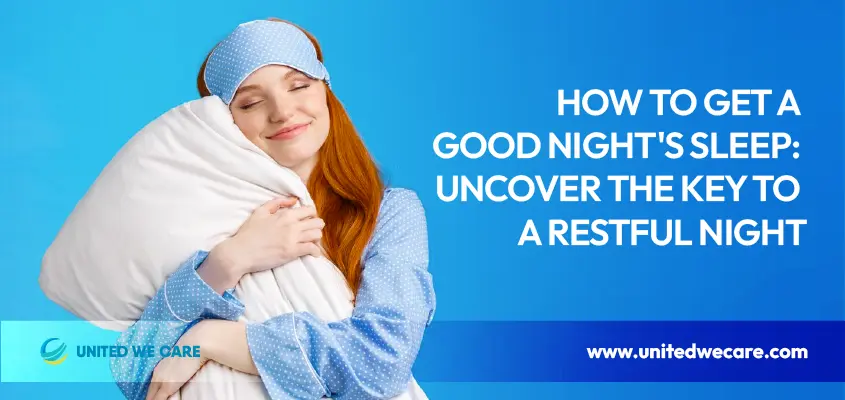Introduction
Have you ever woken up after an 8-hour sleep and still felt like you barely slept? Have you woken up feeling tired or with a headache? It’s probably because you are not getting a good night’s sleep. Good and restful sleep is important for your overall well-being. When we sleep well, our mind and body go into repair mode and help us overcome infections, illnesses, and disorders. In this article, I will guide you through what you can do to make sure that you get enough sleep so that you can heal yourself more quickly and wake up feeling fresh.
“Sleep is that golden chain that ties health and our bodies together.” -Thomas Dekker [1]
What Does Having a Restful Night’s Sleep Mean?
If you want to know if you have had a restful night’s sleep or not, then check how you woke up. If you woke up feeling fresh and did not wake up in the middle of your sleep, then you surely had a restful night’s sleep. When you get a good night’s sleep, your mind and body are able to recharge themselves so that they can help us heal ourselves and recover from pains and illnesses. Restful sleep basically has to be checked on two parameters –
- Duration of your sleep, which should generally be 6 to 8 hours for adults.
- Quality of your sleep, which means that you barely woke up at night.
When you wake up feeling fresh, you will notice that you are able to stay alert during the day. In fact, not only are you able to heal yourself from illness, but you also become less prone to major health conditions, like anxiety, depression, heart-related concerns, etc. [2].
What is the Importance of Having a Restful Night’s Sleep?
If you knew that after a restful sleep, you would wake up feeling great and ready to conquer the world, wouldn’t you want to achieve that? But, still, let me share in what all ways can a restful sleep help you [3]:

- Cognitive Function: When you get a restful sleep, you will notice that you think better, remember better, and find more creative solutions to problems. That way, you are able to learn more and process any information coming your way faster.
- Emotional Well-being: I’m sure you’ve noticed that when you sleep well, you are happy and excited throughout the same. Good and sufficient sleep can help you in managing your emotions. In fact, you will feel less irritable and angry if you’ve had a restful sleep. Insufficient sleep can make you more prone to having stress, anxiety, and depression.
- Physical Health: While we sleep, our brain activates the recovery mode. Thus, good sleep is important for you to recover from illnesses and injuries. If you don’t get enough sleep, you can be at risk of getting chronic diseases like heart-related issues, diabetes, obesity, hypertension, etc.
- Productivity and Performance: When you get sufficient sleep, you are able to focus more on your daily tasks and do them to the best of your abilities. That way, your productivity and performance also increase, whether it’s at school, work, or at home.
- Safety: When you don’t get enough sleep, why can be more at risk for accidents and mistakes. One of my close friends was sleep deprived and ended up having a horrible accident because he shut his eyes for two seconds.
- Overall Well-being: When you get an adequate amount of rest and sleep, you will notice that you are more energetic, think positively, and feel that you are in the best of health and comfort.
What are Some of the Common Myths About A Restful Night’s Sleep?
I’m sure you have a lot of questions going on in your mind – how many hours of sleep is enough, is it ok to have a pill, etc., right? Let’s burst some myths [4]:
Myth 1: “You can catch up on sleep during weekends.”
The truth is, you can’t. I remember that Monday to Friday, I used to be exhausted at work and feel that I’ll sleep through the weekend. But, by doing that, I would feel more and more tired and still sleepy during the day.
Myth 2: “Alcohol helps you sleep better.”
You might have heard some friends say that if you can’t sleep, take a drink and sleep. Although alcohol can make you feel drowsy initially, the high you get from it stops your mind and body from completely relaxing. That is why, most often, after a night of drinking, you wake up with a headache and body aches. In fact, alcohol can cause snoring and block your air passages, causing sleep apnea.
Myth 3: “Watching TV or using electronic devices before bed helps you relax.”
I used to scroll for hours before sleeping, thinking that it would help me fall asleep faster. But, electronic devices emit a blue light that messes up with the stages of sleep. So, most often, you lie awake for many hours and then wake up with a heavy head.
Myth 4: “Sleeping pills are a long-term solution for sleep problems.”
Some doctors can recommend sleeping pills, but these are only to be had under the supervision of your doctor. When you use these pills for a long time, you’re more prone to become dependent, which can cause insomnia, and you will not be able to sleep at all.
Myth 5: “Snoring is harmless.”
Snoring can indicate sleep apnea, which is a sleep disorder that can cause major health conditions like heart attack, hypertension, etc. So, the next time a friend or family member laughs at you for snoring or makes a video of you snoring while sleeping, take it seriously.
What are the Tips for Getting a Restful Night’s Sleep?
I’m sure many people must have already told you certain ways you can get a good night’s sleep, but let me share tricks that worked for me [5]:

- Routine Before Bedtime: I started sleeping and waking up at the same time every day, even on the weekends. In fact, it so happened that my body clock would not allow me to stay awake past a certain time or sleep after a certain time. Doing so, I gave my body enough time to know that it has to start shutting down some functions and my mind to stop the thoughts so that I can sleep.
- Relaxing Sleep Environment: I would make sure that my bed was comfortable and that I was not sleeping uncomfortably. Plus, I would make sure that the room temperature is between 24 to 27 degrees Celsius. If needed, I would use eye masks and earplugs to make sure that no light or sound was disturbing me. I even tried some sleep meditation as well.
- Good Sleep Hygiene: I would make sure to shut off my TV, laptop, and phone at least 30 minutes before sleeping. I would prefer taking a warm bath or reading to allow my body and mind to understand that it’s time to drift to the land of dreams.
- Stimulants and Heavy Meals: I would make sure not to have a very heavy meal before bed. My caffeine consumption was also reduced. If you are a smoker and a drinker, then avoid nicotine and alcohol before sleep. If you need it, surely, you can do that before having a meal. But, sleep after 3-4 hours of eating.
- Exercise Regularly: I started working out regularly, even if it was for 30 mins. When we exercise, our body releases happy hormones and gets rid of all the toxins. That way, you can sleep better. However, make sure not to do any heavy exercises before sleeping because that can make your mind more active.
- Manage Stress: I even practiced techniques that could help me manage my stress levels. I added meditation and breathing exercises to my routine. You can even add journaling if you like to pen down your thoughts. That way, you would be able to get rid of the stress. A stress-free mind is a happy mind, which can help you sleep better.
Conclusion
Sleep is very important for all of us, and getting a good night’s sleep can be a game changer. When you sleep well, you can be more active in your life and perform better in your daily tasks. However, not getting enough sleep or waking up tired can cause many problems – emotionally, mentally, and physically. So look at the techniques mentioned in the article and see what works best for you.
If you face any sleep-related concerns, contact our expert counselors or explore more content at United We Care! At United We Care, a team of wellness and mental health experts will guide you with the best methods for your well-being. Additionally, you can join the Sleep Wellness Program and Advanced Wellness Program for Sleep Disorders at United We Care.
References
[1] “Thomas Dekker Quotes,” BrainyQuote. https://www.brainyquote.com/quotes/thomas_dekker_204715
[2] “Why Do We Need Sleep? | Sleep Foundation,” Sleep Foundation, Jun. 26, 2014. https://www.sleepfoundation.org/how-sleep-works/why-do-we-need-sleep
[3] J. Kohyama, “Which Is More Important for Health: Sleep Quantity or Sleep Quality?,” Children, vol. 8, no. 7, p. 542, Jun. 2021, doi: 10.3390/children8070542.
[4] “Five Common Misbeliefs About Sleep,” Sophie Lambert, M.S., Nov. 20, 2020. https://sclambert.wordpress.com/2020/11/20/facts-and-myths-about-sleep-deprivation/
[5] “How to Sleep: Tips for A Good Night’s Rest | Vitable Australia,” How to Sleep: Tips for A Good Night’s Rest | Vitable Australia, Oct. 24, 2021. https://www.vitable.com.au/blog/tips-to-get-restful-sleep-at-night





